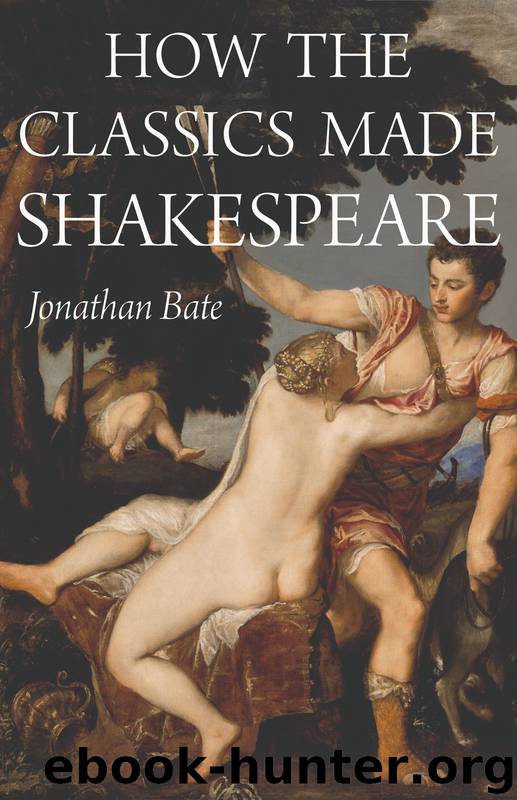How the Classics Made Shakespeare by Bate Jonathan;

Author:Bate, Jonathan;
Language: eng
Format: epub
Publisher: Princeton University Press
Published: 2019-03-02T00:00:00+00:00
11
AN INFIRMITY NAMED HEREOS
WHERE DO WE GET OUR IDEA OF ROMANTIC LOVE? For the last hundred years, the answer has probably been: from Hollywood, from romantic fiction, and from popular music. Where action movies are about heroes—the modern equivalents of those figures such as Hector and Achilles, Aeneas and Alexander the Great—RomComs and tearjerkers are about lovers. Casablanca and Brief Encounter, Love Story and Love Actually. Then there has been the huge industry aimed predominantly at a female audience, exemplified in fiction by Harlequin and Mills and Boon romances. And then of course there are the songs that have provided the soundtrack of the love lives of most people since the invention of radio and the gramophone record: “What is this thing called love?,” “Have I told you lately that I love you?,” “You’re the one that I want,” “She loves you yeah yeah yeah.”
Where did Shakespeare’s original audiences get their idea of romantic love? Just as novels, movies, and pop songs have shaped the idea in the last hundred years, so poets and creative artists past and present shaped the idea in the sixteenth century—and duly had their romantic notions questioned by the authors of conduct books, the equivalent of modern magazine columnists offering marital advice and agony auntery. Ophelia’s love-madness is expressed through her singing of ballads—Elizabethan pop songs—such as “How should I your true love know?” and “For bonny sweet Robin is all my joy.”1 Thomas Morley’s setting of “It was a lover and his lass” from As You Like It was what we would now call a “hit.”2 The literate, meanwhile, purchased love poems. In a pair of plays called The Return from Parnassus, performed by Cambridge students, a lovesick character called Gullio starts quoting in what he calls “Mr Shakespeare’s vein.” Another character, Ingenioso, accuses him of “monstrous theft” from Romeo and Juliet and says, “We shall have nothing but pure Shakespeare and shreds of poetry that he hath gathered at the theatres.” “I’ll worship sweet Mr Shakespeare,” says Gullio, “and to honour him will lay his Venus and Adonis under my pillow.”3 The language of love is learned from Romeo and Juliet and Venus and Adonis. To judge by number of reprints and frequency of allusions, the latter was the bestselling volume of single-authored poetry of the Elizabethan age. I say single-authored because an even more popular volume was the anthology called Songs and Sonnets that gathered together the love-poetry of Thomas Wyatt, the Earl of Surrey, and others—modern scholars name it for its publisher as Tottel’s Miscellany. That book is the vade mecum of one of Shakespeare’s less imaginative lovers, Abraham Slender in The Merry Wives of Windsor: “I had rather than forty shillings I had my Book of Songs and Sonnets here.”4 Books of sonnets were handbooks for wooers, and the theatre was a school of love.
Romantic love was everywhere in the literature of the 1590s. Giles Fletcher teased the reader in the preface to his 1593 sonnet sequence Licia by refusing
Download
This site does not store any files on its server. We only index and link to content provided by other sites. Please contact the content providers to delete copyright contents if any and email us, we'll remove relevant links or contents immediately.
| Ancient & Classical | Arthurian Romance |
| Beat Generation | Feminist |
| Gothic & Romantic | LGBT |
| Medieval | Modern |
| Modernism | Postmodernism |
| Renaissance | Shakespeare |
| Surrealism | Victorian |
4 3 2 1: A Novel by Paul Auster(12354)
The handmaid's tale by Margaret Atwood(7730)
Giovanni's Room by James Baldwin(7301)
Asking the Right Questions: A Guide to Critical Thinking by M. Neil Browne & Stuart M. Keeley(5741)
Big Magic: Creative Living Beyond Fear by Elizabeth Gilbert(5726)
Ego Is the Enemy by Ryan Holiday(5392)
The Body: A Guide for Occupants by Bill Bryson(5065)
On Writing A Memoir of the Craft by Stephen King(4920)
Ken Follett - World without end by Ken Follett(4706)
Adulting by Kelly Williams Brown(4552)
Bluets by Maggie Nelson(4534)
Eat That Frog! by Brian Tracy(4500)
Guilty Pleasures by Laurell K Hamilton(4425)
The Poetry of Pablo Neruda by Pablo Neruda(4079)
Alive: The Story of the Andes Survivors by Piers Paul Read(4010)
White Noise - A Novel by Don DeLillo(3990)
Fingerprints of the Gods by Graham Hancock(3979)
The Book of Joy by Dalai Lama(3961)
The Bookshop by Penelope Fitzgerald(3827)
